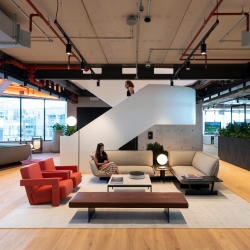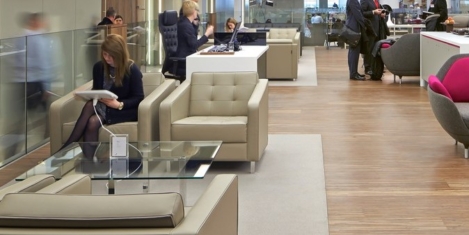June 16, 2021
Seminar will explore the route to a great workplace culture
 The events of the past 16 months have focussed attention on how we best bring people together to work, collaborate and learn from each other. That is why workplace occupancy and collaboration technology specialist Jooxter has curated a new webinar to help firms understand the challenges and opportunities they have in the new era of dispersed collaborative work. The webinar will explore how they can best bring people together, offer them a world class workplace experience and achieve great results. A panel of experts will discuss the evolution of hybrid working and how to create a team culture for better collaboration.
The events of the past 16 months have focussed attention on how we best bring people together to work, collaborate and learn from each other. That is why workplace occupancy and collaboration technology specialist Jooxter has curated a new webinar to help firms understand the challenges and opportunities they have in the new era of dispersed collaborative work. The webinar will explore how they can best bring people together, offer them a world class workplace experience and achieve great results. A panel of experts will discuss the evolution of hybrid working and how to create a team culture for better collaboration.







 A new report from the RSA and Vitality warns of the potentially serious impact on the long-term physical and mental health of employees. The authors claim that the ‘long lockdown effect’ should lead employers to see health and wellbeing as important strategic issues and place them on the company’s risk registers. With the shift to more flexible working cultures now set to continue,
A new report from the RSA and Vitality warns of the potentially serious impact on the long-term physical and mental health of employees. The authors claim that the ‘long lockdown effect’ should lead employers to see health and wellbeing as important strategic issues and place them on the company’s risk registers. With the shift to more flexible working cultures now set to continue, 
 A new study conducted by
A new study conducted by 
 Research from
Research from 
 Employees feel they need to go back into the office in order to be promoted according to new research conducted within the “Reinventing Work” chair at
Employees feel they need to go back into the office in order to be promoted according to new research conducted within the “Reinventing Work” chair at 
 Mobile access company
Mobile access company 


 When it comes to conversations about work and workplaces, the past year has offered a fully immersive experience. Everybody now has an opinion. Inevitably some of them are better informed and more rooted in experience than others. So, after a full year of talk and as we return to some form of routine working life, the time has come to take stock. Few organisations and people will remain untouched by the sudden shift in attitudes towards working life, so we asked four workplace experts for their views on the current state of play.
When it comes to conversations about work and workplaces, the past year has offered a fully immersive experience. Everybody now has an opinion. Inevitably some of them are better informed and more rooted in experience than others. So, after a full year of talk and as we return to some form of routine working life, the time has come to take stock. Few organisations and people will remain untouched by the sudden shift in attitudes towards working life, so we asked four workplace experts for their views on the current state of play. 


 Jooxter has announced the expansion of its operations into the UK and Ireland.
Jooxter has announced the expansion of its operations into the UK and Ireland. 
 Organisations and businesses have a lot to contend with as they begin to reopen their offices. From social distancing, working from home policies, office layouts, hand gel stations and more. But there also remains one key issue when it comes to welcoming employees back to the office. And that’s how they will get to work in the first place. That’s because the daily commute is going to look a lot different than it did pre-COVID. Firstly, while many employers and workers see the benefit of meeting in person, the hybrid world we now live in will see workers commuting to the office far less frequently. And, if they do travel to the office, there is an element of hesitancy about how they will get there; a recent study revealed
Organisations and businesses have a lot to contend with as they begin to reopen their offices. From social distancing, working from home policies, office layouts, hand gel stations and more. But there also remains one key issue when it comes to welcoming employees back to the office. And that’s how they will get to work in the first place. That’s because the daily commute is going to look a lot different than it did pre-COVID. Firstly, while many employers and workers see the benefit of meeting in person, the hybrid world we now live in will see workers commuting to the office far less frequently. And, if they do travel to the office, there is an element of hesitancy about how they will get there; a recent study revealed 







June 4, 2021
Expect to see a growing number of people with the job title Head of Remote
by Jo Deal • Comment, Flexible working